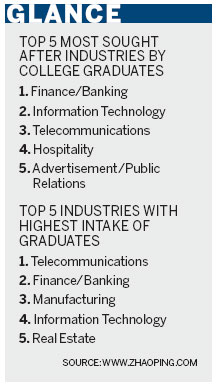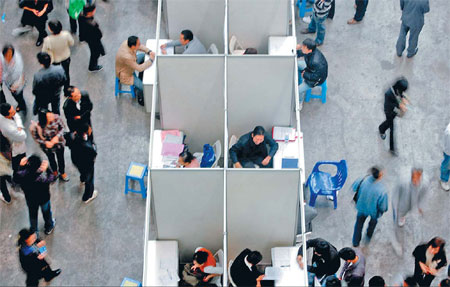Society
Want money, won't travel
Updated: 2011-08-11 07:49
By Guo Shuhan and Lin Qi (China Daily)
|
More than 100,000 college graduates attend a job fair held in Chongqing municipality. Zhang Wei and Xu Kangping / for China Daily |

Today's newcomers to the job market have unrealistic expectations, say HR managers, but fresh graduates seem to have their own opinions. Guo Shuhan and Lin Qi report.
Gao Tao is not content with his job, even though it has given him his hukou (the permanent residence permit which helps with house or car purchases) and his salary is higher than he anticipated. The recent postgraduate, who specialized in Information Technology (IT) systems analysis and integration from Beijing Jiaotong University, is unhappy that the job offers "no year-end bonus and involves the possibility of frequent business trips".
Gao is one of more than 100 new recruits offered a hukou by Boya Software, a company that specializes in software and IT services.
He wants to be associated only with Beijing-based projects, saying his girlfriend will complain if he has to stay in other cities for two or three months to deal with clients.
Employers are increasingly frowning on what they deem "high demands" like Gao's and lament that this is becoming common among new graduates and postgraduates.
"We're glad to see graduates equipped with professional skills, but are taken aback at such unrealistic expectations," says Chen Zengan, Boya's Human Resources manager, who interviewed more than 2,000 applicants this year.
"Fresh graduates should realize they are starting from scratch."
He says many interviewees expressed a reluctance to travel just like Gao. But travel to the clients' place of operations, he says, is fundamental to the job of an IT service provider.
Chen adds that about 20 percent of the applicants this year wanted a hukou, even though only postgraduates can be issued one.
The HR manager says the applicants expected a monthly salary of 8,000 yuan ($1,242), which is nearly twice what the company usually pays for graduates.
He also says some students, especially those from major cities, are influenced by their parents, who prefer their children join the civil service with its guarantee of an "iron rice bowl" (or low risk of being fired) and plenty of perks. It also means few business trips and a typical starting salary of 3,000 yuan each month.
Chen says many graduates come to private companies with such expectations.
Some parents worry about their daughters staying in a hotel, while providing IT services in other cities. They assume, wrongly, that they will have to share rooms with men and feel uncomfortable with the idea, Chen says.
Other parents, he says, call in person to enquire about their daughters' job responsibilities.
They even decline job offers on behalf of their children, if the job title says assistant manager, believing that means the job will involve dining and drinking with clients, Chen reveals.
"Many parents are not familiar with today's job market and don't realize their suggestions may result in their children missing a good chance," Chen says.
Meanwhile, many employers also express displeasure over their new employees' work attitudes.
Few graduates nowadays want to start from the bottom to achieve their career goals, says Xu Jingying, a veteran HR manager at a private electronic company in Guangdong province's Shenzhen city.
For some, Xu says, salary is the only consideration while choosing from among various job offers.
During interviews, most candidates are flummoxed when asked about their career goals for the next five years, she says.
"Most are speechless at first, and usually react by saying, 'I think I may be promoted', or 'I want to be a professional manager'."
The lack of professionalism among fresh graduates also rankles.
Ma Qing, head of human resources, Siemens North East Asia, says most young employees - especially of the post-1980 generation - display a need to be constantly complimented and acknowledged by their superiors for every small progress they make.
And if that is not forthcoming, they quickly feel discouraged.
Liu Yuebo, director of the career development center at Nankai University, Tianjin, says: "College students today are different from those of my generation, born in the 1970s. They lack tenacity and resistance to stress."
On the high salary requests, Liu says it is a reflection of the rising focus on material wealth in Chinese society.
Wang Dongxia, director of the Career Development Center at Guanghua School of Management, Peking University, says she believes the high demands may be linked to rising living costs.
For example, Jia Qi, a postgraduate major in radio and television broadcasting, works for a media company in Shanghai.
The Zhejiang native rents an apartment with her friend for 1,500 yuan each month in the city's western Changning district, a 45-minute subway ride to her place of work downtown.
She usually spends at least 60 yuan on her lunch and supper on weekdays, cooking at home on weekends.
Although she makes 5,000 yuan a month, she does not think she can afford to purchase her own house or car any time soon. Real estate prices for a secondhand apartment in the community she lives in is at least 20,000 yuan per square meter.
Wang adds, however, that graduates should be practical and think about how much they can contribute to the company while voicing their salary expectations.
However, there are graduates who understand that their first job is not the time to focus on salary.
Huang Haidong, who majored in economics at Guanghua, Peking Universtiy and holds a double degree in statistics from the School of Mathematical Sciences, thinks salary figures should not matter for the first three years.
"The important thing is to find a good platform where you can develop your social network and learn the ropes. I believe an excellent worker will always be valued by their employer and paid accordingly," Huang says.
Chen Lijiao, from Wenzhou Medical College in Zhejiang province, thinks a starting salary of 2,000 yuan is fair for a medical graduate.
"I will earn more as I gain in experience and reputation," she says.
E-paper

My Chinese Valentine
Local businesses are cashing in on a traditional love story involving a cow herder and a goddess
Outdoor success
Lifting the veil
Allure of mystery
Specials

Star journalist leaves legacy
Li Xing, China Daily's assistant editor-in-chief and veteran columnist, died of a cerebral hemorrhage on Aug 7 in Washington DC, US.

Sowing the seeds of doubt
The presence in China of multinationals such as Monsanto and Pioneer is sparking controversy

Lifting the veil
Beijing's Palace Museum, also known as the Forbidden City, is steeped in history, dreams and tears, which are perfectly reflected in design.

